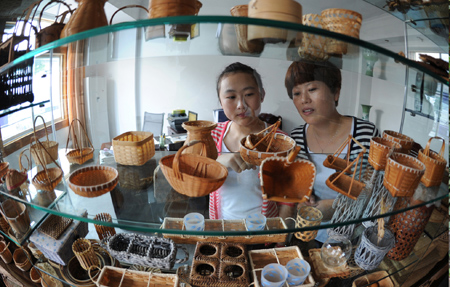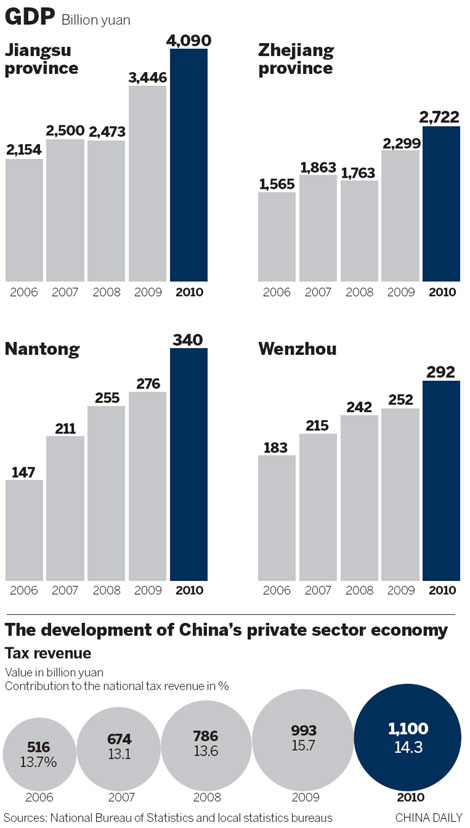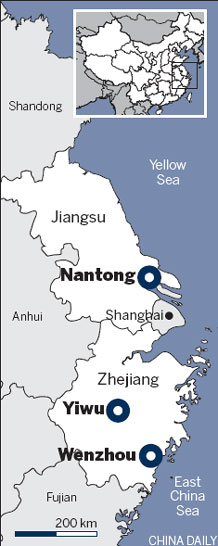Companies
A latter-day tale of three Chinese cities
By Yu Ran and Shi Jing (China Daily)
Updated: 2011-06-13 09:35
 |
Large Medium Small |
|
 |
|
Tourists shopping for handicraft products in Wuyi, Zhejiang province. China's booming private economy features entrepreneurial spirit as well as regional divergence. [Photo / China Daily] |
SHANGHAI - In contrast with boomtowns such as restless Wenzhou and flashy Yiwu in prosperous Zhejiang province, Nantong, a textile manufacturing center in the equally prosperous Jiangsu province, is a study in conservatism and restraint.
Of course, it's all about the people, or more precisely, the business people whose entrepreneurial spirit has turned these backwaters into economic powerhouses. Their achievements have shown that, contrary to a belief prevalent among some business people, China's economic development is anything but monolithic and that regional divergence is not only tolerated but is also recognized as a source of vitality in the best of times and the worst of times.
To understand the engines that have continued to drive Chinese economic growth at a time when the more developed economies of the United States and Europe are faltering, it pays to follow the widely differing approaches taken by the private-sector entrepreneurs in the country's industrial heartland as they attempt to cope with the new challenges arising from the escalating cost of manufacturing.
In the eastern coastal provinces of Jiangsu and Zhejiang, manufacturers of a wide range of consumer goods have known for some time that the days of low-cost labor and land are numbered.
In the past three years the cost of labor in Zhejiang has risen by an aggregate 30 percent. The rate of increase in Jiangsu during the same period was about 20 percent. The manufacturing profit margin has been further squeezed by a rapid increase in the cost of materials, fuelled by the rise in the price of oil and other factors.
Profit margins have also been affected by the rise in the value of the yuan against many of the world's major currencies. It has appreciated by 1.9 percent against the US dollar in the past five months, and by 28 percent since China began its revaluation process in 2005. In the face of stiff competition, especially from other emerging markets, many Chinese exporters have absorbed the foreign-exchange losses for fear of losing business.
Unwilling to accept lower profit margins, many entrepreneurs in Wenzhou have taken measures to wind down their manufacturing operations and shift their investments to property, stocks and coal mines - sectors that can produce big profits rapidly. Flush with spare cash, some business people have speculated in collectibles, including antiques, paintings and other less-well-known artifacts, such as yellow gemstones and ancient clay teapots.
The textile tycoons in Nantong have taken a much more low-key approach to wealth diversification, as befits a low-key city which does not flaunt its wealth with a jungle of tall buildings, intertwined with a labyrinth of flyovers.
Zhu Xiaohui came to Nantong from Shanghai some five years ago. Thanks to the Sutong Bridge, which was opened in 2008, she is now able to drive back to her hometown every week, a journey which takes around 60 minutes.
Totally dedicated to her own textile design studio established in late 2007, Zhu said she does not have much time for wandering around the city, but her acquaintance with Nantong's business community has taught her a valuable lesson.
"Quite contrary to my expectations, businessmen in Nantong are quite shrewd. It was quite difficult for me to work with them at first," said Zhu.
"Maybe people in Nantong will not be happy to hear this, but they are actually quite snobbish. For example, if my studio were to close, it is quite possible that my former working partners would not wish to be friends with me any longer. No kidding, and I'm not badmouthing behind others' backs, but I have learned this from my own experiences."
Xue Fei, 40, owns a Nantong-based family-run textile company which supplies the domestic market. It has annual average earnings of 500,000 yuan ($77,000) and has three stores in the city.
"I've never made any extra investments but have expanded the number of stores during the last decade as I don't want to take any risks with my money," said Xue, who has worked in the textile industry for more than a dozen years.
Similarly, Shi Weidong, 43, a manufacturer of wire rope, another well-known industry in Nantong, has rarely plowed his profits into investments as he feels more comfortable and safer leaving them in the bank.

"I just spent 500,000 yuan in the equity market, buying steel-related products, which I deal with every day, because I don't want to put my hard-earned money into any risky investments," said Shi, whose factory receives annual orders worth around 10 million yuan from the domestic and international markets and makes an annual profit of four million yuan.
"I have plenty of friends among Zhejiang's businessmen. They do not pay much attention to what you do and who you are. Whether you are 'useful' to their business or not does not matter so much. In other words, they are not all that pragmatic," said Zhu.
Born and raised in Nantong, Sun Muyang works for the local government. As far as she can see, people in Yiwu and Wenzhou are more concerned about their businesses and work much harder, while the people in her city prefer "leading leisurely lives". Although Nantong also has a long history in the private economy, it is now, unfortunately, "lagging behind" the other cities.
However, Sun is probably being modest about her city. According to Ding Dawei, the mayor of Nantong, the number of private companies registered there in 2010 was the second-highest in Jiangsu province, with 24 of those companies gaining a place in the list of China's top 500 private companies.
Private enterprise accounts for some 60 percent of the city's GDP, an increase of approximately 2 percent compared with 2009. The city has also attracted some 53.6 billion yuan in external investment in the private sector.
The textile industry has always been a pillar of Nantong's economy. In 2010, the industry had output valued at more than 169 billion yuan, a rise of about 17 percent compared with 2009. Two of the city's textile production facilities have been selected as model centers by the World Intellectual Property Organization. In 2010, around 70 of the city's textile brands were ranked by the China Enterprise Confederation as "provincially well-known", and another 40 were categorized as "nationally well-known".
Using the booming regional economy to its advantage, Zhejiang was one of the earliest locations for private enterprise in China. The local government also offers guidance and support services as part of its efforts to boost the non-State-owned economy. At present, 90 percent of local companies are in the private sector.
However, rather than witnessing the arrival of foreign business people, entrepreneurs from Wenzhou have moved outside of the city, and the country, to display their talents in company management.
At the beginning of the 20th century, Wenzhou was home to a large number of foreign businessmen. The great influx of foreign products, accompanied by cultural diversification, stimulated the development of the city's economy and left an impression on the local people.
The more enterprising natives adopted the idea of industrialization from the foreign businesses and quickly transformed their own cottage industries into large-scale production powerhouses. At the last count, Wenzhou had a total of 240,000 privately owned commercial and industrial units, and 130,000 enterprises officially ranked as "conglomerates".
With the increase in the costs of labor and materials, creative Wenzhou merchants have started shifting their focus to investment in other areas.
"On average, every household in Wenzhou owns 1.2 properties in Shanghai," said Gao Lei, who runs the Wenzhou-based Computer Market Development Ltd, which employs about 100 staff. He owns 30 properties nationwide, including five in Shanghai. "It is a way to manage my wealth," he said.
Gao normally flies to different cities within China every month with fellow property investors to look for better investment opportunities in the real estate market.
"I also have put a certain investment in the equity market, which is still developing, and has promising profits which will probably be higher than the returns from buying and selling properties," said Gao.
According to 2009 statistics provided by the local government, villagers in the city's Pingyang county alone owned more than 200 coal mines in Shanxi province, amounting to a total investment of 30 billion yuan. Investments have also been made in the Inner Mongolia autonomous region, and in the provinces of Gansu and Guizhou, all of which are rich in reserves of nonferrous metals.
Chen Jiyan, who spent 15 million yuan on a coalmine in the Aksu prefecture of the Xinjiang Uygur autonomous region in 2004, said his assets have since risen to more than 400 million yuan.
"We never act too ambitiously and feel satisfied with the profits made from our projects. Luckily, we backed away from the coalmine investment in time (to avoid new government restrictions on the industry) and so our investments haven't been severely affected, " he said.
Chen added that the majority of Wenzhou businessmen won't miss an opportunity to make money, even if they have to take certain risks, which is probably the main reason they're richer than many others in the province.
In contrast to those businessmen who pay too much attention to making investments, the CEO of Aokang maintains the perfect balance between his core focus (the company) and his external investments.
"CEO Wang Zhentao is typical of certain Wenzhou merchants who are fond of challenging their limits by stepping into different fields, cooperating with other local merchants, and having the ambition to succeed," according to Wang Hailong, the public relations manager at Zhejiang Aokang Shoes Co.
Aokang has also diversified by launching a company to produce pharmaceutical goods as a high-technology investment. The company's first meningitis vaccine went into production last year.
Based in Wenzhou, China's shoe-manufacturing export hub, Aokang is one of the country's leading manufacturers of footwear, and has experienced good and bad times during recent years.
Aokang employs a system of 10-year targets, in much the same way that China implements five-year plans, and so every decade the production lines are upgraded, improving manufacturing efficiency and lowering material costs.
"We have a different focus for different periods of development, but the key goal is to ensure that Aokang leads the way in being an internationally qualified manufacturer and a well-known shoe brand," said Wang.
Among Wenzhou-based enterprises, four have made it on to the list of China's top 500 enterprises. Moreover, 36 of them are ranked among the top 500 Chinese private-sector enterprises.
"At the moment, Aokang has around 4,000 stores nationwide, and is moving into its next stage of development by designing its own brand of high-quality shoes," said Wang.
Signs of wealth abound in this city of more than 1.7 million people and covering a total area of 1,082 square kilometers. The newly constructed broad boulevards and old narrow roads in the inner-city districts are teeming with expensive cars. New shopping malls and luxury apartment high-rises stand out among old tenement blocks awaiting the wrecking ball.

"Like most of the successful entrepreneurs in Wenzhou, Wang Zhentao started his business with nothing but hard work and the courage to try new things," said Wang Hailong.
According to statistics provided by the local government, more than 600,000 Wenzhou merchants own businesses in 131 countries and regions, and that figure excludes the 1.75 million businessmen who have expanded their enterprises across 190 cities by launching the Wenzhou Chambers of Commerce.
Aokang bought the Chinese rights to the Italian shoe brand Valleverde in 2008. The move included the establishment of joint research and procurement centers in Italy and China.
Since the acquisition, Aokang has increased the number of Valleverde stores in China to 200, and is keen on positioning its products in the high-end market.
"The company is determined to work with other top-brand shoe makers and will move its focus to develop the innovative design of its products over the next five years," said Wang.
"Orders from GEOX, one of Aokang's largest trading partners in Europe, increased by about 60 percent in the first quarter of 2011, and that figure is expected to rise gradually as the year progresses," said Wang.
Statistics show that in the first quarter of this year, Chinese exports rose by 26.2 percent, while imports increased 46.7 percent.
Meanwhile, in Yiwu, Zhejiang province, the wealthy businessmen are now driving top-brand cars, but that wasn't always the case.
Back in the 1980s, Yiwu - at that point a county with no geographical advantages and few natural resources - was just one among hundreds of poverty-stricken centers whose citizens survived largely by farming.
"Thanks to the local government for helping me out at the beginning with my business and creating a promising economic environment for merchants to trade small products," said Zhou Xiaoguang, the CEO of China Xinguang Group, which has total assets of 12.5 billion yuan.
Since China's economic opening-up in 1978, the market in Yiwu has seen the production of 100,000 varieties of "small products" - mainly jewelry, accessories and gift-related goods - in 28 primary categories. The number of daily business visitors has reached 160,000, including more than 2,000 foreign purchasers. The market has enabled non-State-owned industries to grow and this, in turn, has boosted the local economy and created 500,000 jobs. The city's annual tax revenue exceeds 600 million yuan.
| ||||
The city has become home to the world's largest enterprises in industries as diverse as zippers, socks and jewelry. Local business people have a reputation in China for being smart and confident.
"I think that Yiwu's merchants are quite consistent with their businesses, even if they are just selling small commodities. We always have the need and passion to learn from other businessmen," said Zhou.
Zhou added that businessmen from Yiwu and Wenzhou are born to be merchants, but those in Yiwu concentrate harder on one particular field and are more patient.
| 分享按鈕 |



